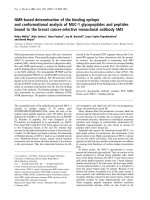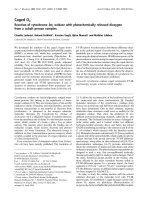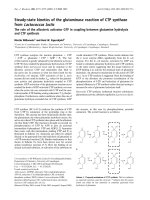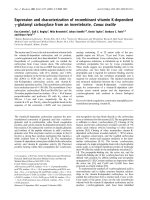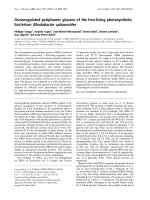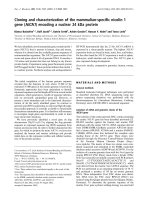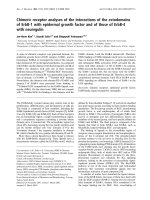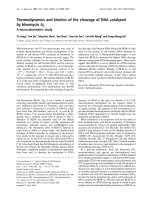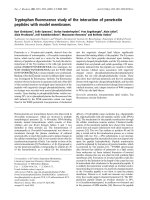Báo cáo y học: "Inflammatory fibroid polyp of the ileum presenting with small bowel obstruction in an adult patient: a case report" pdf
Bạn đang xem bản rút gọn của tài liệu. Xem và tải ngay bản đầy đủ của tài liệu tại đây (417.59 KB, 4 trang )
CAS E REP O R T Open Access
Inflammatory fibroid polyp of the ileum
presenting with small bowel obstruction in an
adult patient: a case report
Toygar Toydemir
Abstract
Introduction: Inflammatory fibroid polyps are rare benign tumors of the gastrointestinal tract with the gastric
antrum being the most common site, followed by the ileum. Histogenesis is still unknown and controversial.
Inflammatory fibroid polyps are one of the rare benign conditions leading to intestinal obstruction in adults.
Case presentation: A 54-year-old Caucasian man presented with acute abdomen pain and a two month history
of intermittent cramping and lower abdominal pain. Computed tomography imaging demonstrated a partial
intestinal obstruction in the location of the terminal ileum. An ileo-ileal intussusception due to a mass lesion 15 cm
proximal to the caecum was found on exploratory laparotomy. Intussusception was spontaneously reduced during
exploration and a wedge resection was performed to the affected bowel segment. Histopathologic examination
showed the mass to be an inflammatory fibroid polyp.
Conclusion: Although inflammatory fibroid polyps are rare and benign, in the case of intestinal obstruction the
only solution is a surgical approach.
Introduction
Intussusception is an uncommon cause of intestinal
obstruction i n adults [1]. Patients with intussusception
present with either acute or chronic intermittent symp-
toms. The majority of adult intussusceptions occur due
to malignant processes [2]. We report the case of an
adult inflammatory fibroid polyp (IFP) confined to the
terminal ileum which presented with acute symptoms
and a repeated intuss usception background histor y. The
aim of this study is to remind that some very rare etio-
logies may be involved in adult intestinal obstructions.
Case presentation
A 54-year-old Caucasian, Turkish man presented to the
emergency department with acute abdominal pain, nau-
sea and vomiting and a two month history of intermit-
tent lower abdominal pain. There was no history o f
previous abdominal surgery, smoking or alcohol
consumption.
On examination , he was uncomfortable an d had a
heart rate of 110, blood pressure 140/70 mmHg, and a
temperature of 37.5°C. Generalized abdominal pain was
found on abdominal examination without signs o f peri-
toneal irritation. Bowel sounds were normal. Laboratory
analysi s revealed 15,000 leukocytes with a prevalence of
neutrophils. Other parameters were within the normal
limits. Abdominal radiology demonstrated a few air-
fluid levels in the right lower quadrant. An intravenous
and oral contrast computed tomography showed partial
intestinal obstruction in the terminal ileum without gen-
eralized small bowel dilatation.
An exploratory laparotomy was performed w ith the
diagnosis of subacute intestinal obstruction. An intus-
susception with a mass lesion at its lead point a pproxi-
mately 15 cm proximal to the caecum was found.
Intussusception was spontaneously reduced during
exploration. Limited edema at the lead point of the
bowel, was the only sign of the intussusception (Figures
1 and 2). A wedge resection was performed to the
affected bowel segment.
Correspondence:
Department of General Surgery, İstanbul Surgery Hospital, Ferah sokak no:18
nişantaşı, 34365 İstanbul/Turkey
Toydemir Journal of Medical Case Reports 2010, 4:291
/>JOURNAL OF MEDICAL
CASE REPORTS
© 2010 Toydemir; licensee BioMed Central Ltd. This is an Open Access article distributed under the terms of the Creative Commons
Attribution License ( 2.0), which permits unrestricted use, distribution, and reproduction in
any medium, provided the original work is properly cited.
Histopatol ogic examinat ion showed proliferated vessel
formations in a mixoid stroma and inflammatory cell
infiltration consistent with IFP.
Discussion
IFPs are among the least common benign lesions of
the gastrointestinal tract. They originate from the sub-
mucosa as a solitary or sessile lesion with an inflam-
matory basis. They can occur throughout the intestinal
tract but most frequently in the gastric antrum and
small bowel [3]. IFPs usually measure between two and
5 cm in diameter. However, there are also giant IFPs
with a size of up to 12.5 cm in diameter having been
reported [4]. IFP was first described by Vanek as a
‘gast ric submucosal granuloma with eosino philic infil-
tration’ in 1949 [5]. Histologically, IFPs are character-
ized by vascular and fibroblast proliferation with an
eosinophilic inflammatory response. The underlying
cause of IFP remains uncertain. Many factors have
been suggested as a trigger such as intestinal trauma
or eosinophilic gastroenteritis.
IFPs are usually asymptomatic, identified during endo-
scopy or laparotomy. When they are symptomatic the
clinical presentation is determined by the anatomic loca-
tion. Gastric IFPs may lead to pyloric obstruction or
anemia with chronic bleeding [6]. When they ari se from
the small bowel, intussusception is the most common
clinical finding.
Adult intussusception is a very rare condition,
accounting for 1% of all adult bowel obstruction and
occurs in only 5% to 16% of all intussuscepted cases [2].
About 70% to 90% of intussusception cases are due to
benign or malignant neoplasms as a lead point and IFPs,
lipomas and adenomas are the benign causes of intus-
susception [7]. However, it has been shown that intus-
susception can occur without significant pathological
cause [8].
Unlike the more common idiopathic i ntussusception
found in children, intussusception in adult patients still
remains a surgical disease. The type of surgical proce-
dure depends on the patient’s medical history (previous
operations, malignancy) and intra-operative findings [9].
Figure 1 The lead point of intussusception.
Toydemir Journal of Medical Case Reports 2010, 4:291
/>Page 2 of 4
The optimal surgical management of intussusception in
adult patients is influenced by two major factors: the
presence of distinct malignancy and the local factors
such as the degree of associated edema, and relative
ischemia of the involved bowel. A wedge resection of
affected bowel segment was performed in our case as
very limited edema was observed at lead point of intus-
susception. However, attempts at local removal of
polyps through a limited enterotomy, or by wedge resec-
tion through edematous bowel, may be dangerous and
health y bowel margins must be secure during segmental
resection.
Conclusions
İ ntussusception is a very rare cause of adult intestinal
obstruction and IFP is one of the least common causes
of this rare condition. Although IFPs are benign lesions,
surgical treatment is the only solution when they pre-
sent with small bowel obstruction.
Consent
Written informed consent was obtained from the patient
for publication of this case report and any accompany-
ing images. A copy of the written consent is available
for review by the Editor-in-Chief of this journal.
Authors’ contributions
TT is the only author of this paper. TT designed the study and wrote the
manuscript.
Competing interests
The author declares that they have no competing interests.
Received: 29 January 2010 Accepted: 30 August 2010
Published: 30 August 2010
References
1. Huang BY, Warshauer DM: Adult intussusception: diagnosis and clinical
relevance. Radiol Clin North Am 2003, 41:1137-1151.
2. Eisen LK, Cunningham JD, Aufses AH Jr: Intussusception in adults:
institutional review. J Am Coll Surg 1999, 188:390-395.
3. Wysocki AP, Taylor G, Windsor JA: Inflammatory fibroid polyps of the
duodenum: a review of the literature. Dig Surg 2007, 24(3):162-168.
Figure 2 The view of IFP before resection.
Toydemir Journal of Medical Case Reports 2010, 4:291
/>Page 3 of 4
4. Harned RK, Buck JL, Shekitha KM: Inflammatory fibroid polyps of the
gastrointestinal tract: Radiologic evaluation. Radiology 1992, 182:863-866.
5. Vanek J: Gastric submucosal granuloma with eosinophilic infiltration. Am
J Pathol 1949, 25(3):397-411.
6. Gonul II, Erdem O, Ataoglu O: Inflammatory fibroid polyp of the ileum
causing intussusception: a case report. Turk J Gastroenterol 2004, 15:59-62.
7. Karamercan A, Kurukahvecioglu O, Yilmaz TU, Aygencel G, Aytaç B, Sare M:
Adult ileal intussusception: an unusual emergency condition. Adv Ther
2006, 23:163-168.
8. Lvoff N, Breiman RS, Coakley FV, Lu Y, Warren RS: Distinguishing features
of self-limiting adult small-bowel intussusception identified at CT.
Radiology 2003, 227:68-72.
9. Yalamarthi S, Smith RC: Adult intussusception: case reports and review of
literature. Postgrad Med J 2005, 81(953):174-177.
doi:10.1186/1752-1947-4-291
Cite this article as: Toydemir: Inflammatory fibroid polyp of the ileum
presenting with small bowel obstruction in an adult patient: a case
report. Journal of Medical Case Reports 2010 4:291.
Submit your next manuscript to BioMed Central
and take full advantage of:
• Convenient online submission
• Thorough peer review
• No space constraints or color figure charges
• Immediate publication on acceptance
• Inclusion in PubMed, CAS, Scopus and Google Scholar
• Research which is freely available for redistribution
Submit your manuscript at
www.biomedcentral.com/submit
Toydemir Journal of Medical Case Reports 2010, 4:291
/>Page 4 of 4
